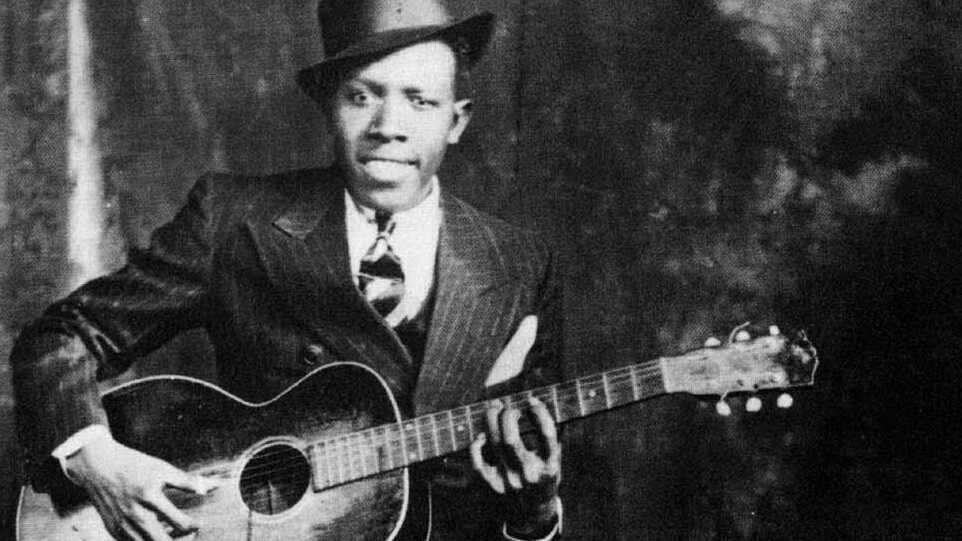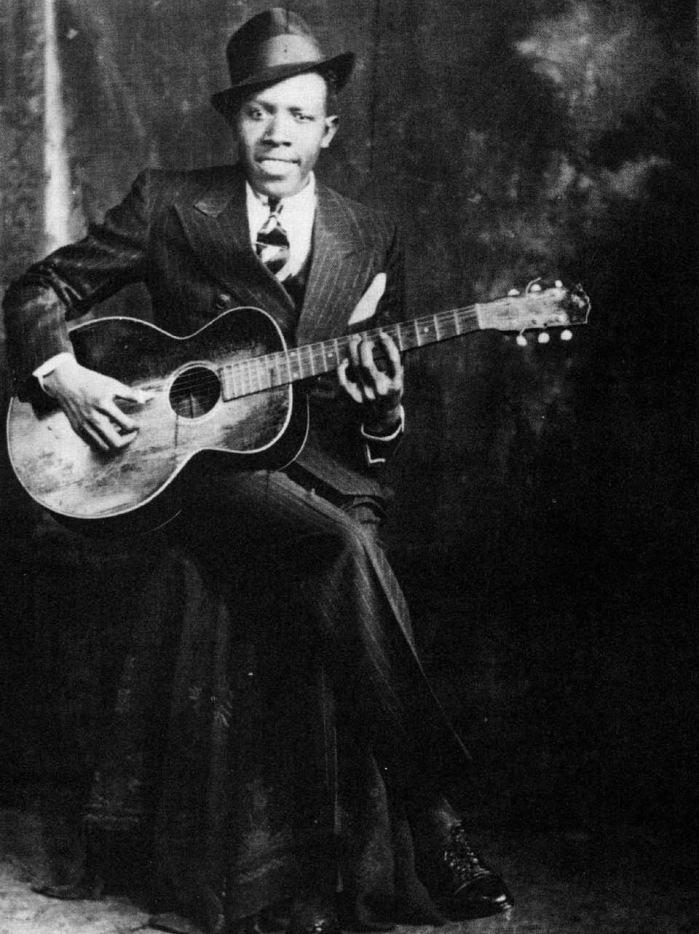what musician sold his soul to the devil

One of the two known photos of Robert Johnson. This portrait was taken by the Hooks Bros. Photography Company in Memphis, Tenn., circa 1935. Courtesy of the Delta Brume Corporation hide caption
toggle caption
Courtesy of the Delta Haze Corporation

One of the two known photos of Robert Johnson. This portrait was taken past the Hooks Bros. Photography Visitor in Memphis, Tenn., circa 1935.
Courtesy of the Delta Brume Corporation
Lord's day marks the 100th anniversary of the nascence of Robert Johnson. Although he recorded just 29 songs, the bluesman had a huge influence on guitarists such as Eric Clapton and Keith Richards. Johnson is ane of the about studied of all country blues musicians, and he'south been the subject of many books, films and essays. But the mythology surrounding his life only won't become abroad.
If you know anything about Johnson, chances are it'due south the story that he sold his soul to the devil at the crossroads in exchange for his musical talent. That fable reached a mainstream audience with the 1986 movie Crossroads, starring Joe Seneca and Ralph Macchio.
Only according to folklorist Barry Lee Pearson, information technology didn't happen.
"The popular mythology has him as a full loner," Pearson says, "and kind of lived this life in regret as a repayment for his alleged sin of making a contract with Old Scratch."
Pearson, a professor at the Academy of Maryland and the co-author of the volume Robert Johnson: Lost and Found, says none of it is true. In the absence of any real biographical information, Pearson says early on dejection writers got a niggling carried abroad.
"Everybody was so anxious to brand this devil story truthful that they've been working on finding lilliputian details that can corroborate it," he says.
Here is what we do know about Robert Johnson. He said he was built-in in Mississippi on May viii, 1911, and grew up on a plantation in the Delta. As a young homo, he was more than interested in music than farming: He'd hound the older blues musicians for a chance to play. In an interview included in the 1997 documentary Can't You Hear the Wind Howl, Son House recalls that the immature Johnson would annoy audiences with his lousy guitar playing.
"Folks they come and say, 'Why don't you lot exit and make that male child put that thing down? He running u.s.a. crazy,' " House said. "Finally he left. He run off from his mother and father, and went over in Arkansas some place or other."
When Johnson came back from Arkansas half-dozen months later, he'd mastered the guitar. That'due south where the rumors about his deal with the devil came from, only Johnson acknowledged studying with a homo instructor while he was gone. Subsequently that, Johnson worked equally a traveling musician, playing on street corners and in juke joints, by and large in Mississippi. And in 1936, he got a chance to record in Texas.
"Terraplane Blues" was a minor hit, and he was invited back for a second recording session. Johnson died a year later at age 27, under mysterious circumstances. Some think he was poisoned, although a note on the back of his death certificate says the cause was syphilis.
In whatever case, the timing was tragic. Legendary Columbia Records talent lookout man John Hammond wanted to book Johnson at Carnegie Hall for the landmark "Spirituals to Swing" concert in 1938. Hammond was also the driving forcefulness behind the first LP reissue of Johnson's music in 1961. At the time, Johnson was and then obscure that Columbia didn't even have a film of him to put on the cover. The LP was produced past Frank Driggs, who also wrote the liner notes.
"If you lot read the liner notes," Driggs says, "you see side by side to zip. 'Cause I simply created a affair out of whole material when I wrote the notes. Because there really was very picayune known most the guy."
Upward Against The Wall
That LP, King of the Delta Blues Singers, introduced Johnson's music to a new generation of young, mainly white dejection fans, including Eric Clapton, as the rock legend told NPR in 2004.
"It was on Columbia and information technology had, similar, some pretty interesting sleeve notes on it about the fact that these were the only sides he had cutting, and that they'd washed it in a hotel room, and when he was auditioning for the sessions that he was so shy, he had to play facing into the corner of the room," Clapton says. "I mean, I immediately identified with that, because I was paralyzed with shyness every bit a kid."
But there may exist another reason why Johnson recorded facing the wall. Elijah Wald is a musician and the author of the book Escaping the Delta: Robert Johnson and the Invention of the Dejection. He says there were pre-war dejection musicians who played guitar better than Johnson, besides as musicians who sang amend. But Wald says that, dissimilar most of them, Johnson learned to play from listening to radio and records.
"Robert Johnson certainly was very conscious of what a striking record sounded similar," Wald says. "If you mind to something similar 'Come up on in My Kitchen,' he's singing very quietly, and he actually has a moment when he says, 'Tin can't you lot hear the current of air blowin'.' He whispers information technology and then plays this very placidity riff. That never would accept worked on a street corner or a Mississippi juke articulation, but it sounds great on records."
Sound is i of the main things that distinguishes Johnson'southward sides from other records of the fourth dimension. By facing the wall, Wald says Johnson might have made his vocals audio improve to a later generation accustomed to loftier allegiance. Information technology doesn't hurt that the original masters of his recordings survived, too. Merely what actually set Johnson apart from his peers was all of the mythology that grew up effectually him, especially the part near the devil. Many of Johnson's friends, including Johnny Shines in Tin't You Hear the Wind Howl, dismissed it as simulated.
"No," Shimes says, "he never told me that lie. If he would've, I would've called him a liar right to his confront. You have no control over your soul. How you gonna do anything with your soul?"
But the myth about Johnson persists, in part because information technology helps sell records. Steve Berkowitz is a producer at Sony Legacy, which is reissuing Johnson'south music again, this time in a new centennial edition.
"That was always the middle and soul of the marketing programme," Berkowitz says. "We always knew the music was bully. Merely a guy sells his soul to the devil at midnight down at the crossroads, comes back and plays the hell out of the guitar, and and so he dies. I mean, information technology's a spectacular story."
And there wouldn't be any harm in that, Wald says, except that the legend tends to overshadow the real Robert Johnson.
"To merely say that he went to the crossroads in the dead of night, first of all ways we're not getting what happened. And 2d of all, it's kind of insulting," Wald says. "It'due south kind of implying that, different us who practice this serious work to understand music, these old black blues guys merely went and sold their soul to the devil."
If it were actually that like shooting fish in a barrel, Wald says, the devil would ain the souls of every teenage boy and girl in America.
Source: https://www.npr.org/2011/05/07/136063911/robert-johnson-at-100-still-dispelling-myths
Post a Comment for "what musician sold his soul to the devil"